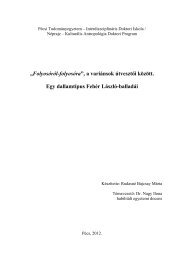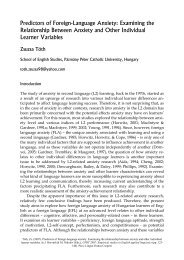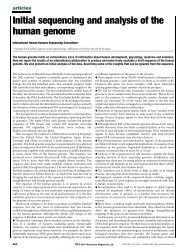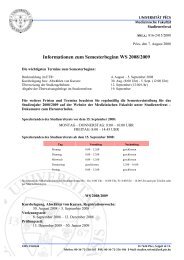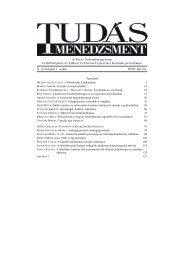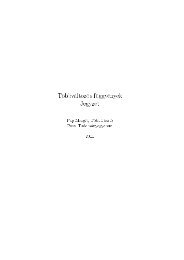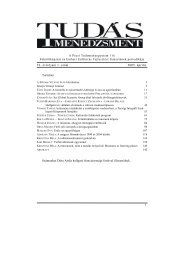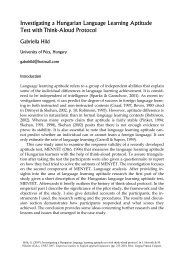2006. évi 1. szám - Jura - Pécsi Tudományegyetem
2006. évi 1. szám - Jura - Pécsi Tudományegyetem
2006. évi 1. szám - Jura - Pécsi Tudományegyetem
Create successful ePaper yourself
Turn your PDF publications into a flip-book with our unique Google optimized e-Paper software.
Boros János: Pragmatizmus és demokratikus jogalkotás<br />
a method of settling metaphysical disputes that otherwise<br />
might be interminable.”<br />
11<br />
W. James: i.m. 26. „The pragmatic method ... is to try<br />
to interpret each notion by tracing its respective practical<br />
consequences.”<br />
12<br />
Vö. uo. „beliefs are really rules of action … to develop<br />
a thought’s meaning, we need only determine what conduct<br />
is fitted to produce: that conduct is for us its sole significance”.<br />
13<br />
W. James: i.m. 27. „There can be no difference in<br />
abstract truth that doesn’t make a difference elsewhere – no<br />
difference in abstract truth that doesn’t express itself in a<br />
difference in concrete fact and in conduct consequent upon<br />
that fact”.<br />
14<br />
Vö. W. James: i.m. 30. „ideas (which themselves are<br />
but parts of our experience) become true just in so far as they<br />
help us to get into satisfactory relation with other parts of<br />
our experience … Any idea upon which we can ride … any<br />
idea that will carry us prosperously from any one part of our<br />
experience to any other part, linking things satisfactorily,<br />
working securely, simplifying, saving labor; is true for just so<br />
much, true in so far forth, true instrumentally.”<br />
15<br />
W. James: i.m. 37. „truth is one species of good”.<br />
16<br />
Uo. „Ought we ever not to believe what it is better for<br />
us to believe”<br />
17<br />
W. James: i.m. 39. „you see, how democrratic she<br />
[pragmatism] is. Her manners are as various and flexible, her<br />
resources as rich and endless, and her conclusions as friendly<br />
as those of mother nature.”<br />
18<br />
W. James: i.m. 132. „It is by dropping it [the evil] out<br />
altogether, throwing it overboard and getting beyond it,<br />
helping to make a universe that shall forget its very place<br />
and name.”<br />
19<br />
John Dewey demokráciafilozófiájáról részletesen írok<br />
említett könyveimben.<br />
20<br />
J. Dewey: The Later Works. Carbondale, Illinois, 14.226.<br />
„democracy is a personal way of individual life”.<br />
21<br />
Uo. „Instead of thinking of our own dispositions and<br />
habits as accomodated to certain institutions, we have to learn<br />
to think of the latter as expressions, projections and extensions<br />
of habitually dominant personal attitudes”.<br />
22<br />
Dewey: i.m. 226-227. “Democracy is a way of life<br />
controlled by a working faith in the possibilities of human<br />
nature. ... That belief is without basis and significance save<br />
as it means faith in the potentialities of human nature as that<br />
nature is exhibited in every human being irrespective of race,<br />
color, sex, birth and family, of material or cultural wealth.<br />
This faith may be enacted in statutes, but it is only on paper<br />
unless it is put in force in the attitutes which human beings<br />
display to one another in all the incidents and relations of<br />
daily life. To denounce Naziism for intolerance, cruelty and<br />
stimulation of hatred amounts to fostering insincerity if, in<br />
our personal relations to other persons, if, in our daily walk<br />
and onversation, we are moved by racial, color or other class<br />
prejudice ... The democratic faith in human equality is belief<br />
that every human being, independent of the quantity or range<br />
of his personal endowment, has the right to equal opportunity<br />
with every other person for development of whatever gifts he<br />
has. The democratic belief ... is [a] belief in the capacity of every<br />
person to lead his own life free from coercion and imposition<br />
by others provided right conditions are supplied.”<br />
23<br />
Dewey: The Later Works. 14.227-228. “everything<br />
which bars freedom and fullness of communication sets up<br />
15<br />
barriers that divide human beings into sets and cliques, into<br />
antagonistic sects and fractions, and thereby undermines the<br />
democratic way of life. Merely legal guarantees of the civil<br />
liberties of free belief, free expression, free assembly are of<br />
little avail if in daily life freedom of communication, the give<br />
and take of ideas, facts, experiences, is choked by mutual<br />
suspicion, by abuse, by fear and hatred. These things destroy<br />
the essential condition of the democratic way of living even<br />
more effectually than open coercion”.<br />
24<br />
Richard Rorty, a Stanford egyetem professzora, a Pécsi<br />
Tudományegyetem díszdoktora. Mûvei magyarul: Esetlegesség,<br />
irónia és szolidaritás. (Fordította Boros János és Csordás<br />
Gábor) Jelenkor, Pécs 1994., Heideggerrõl és másokról.<br />
(Fordította Barabás András, Beck András, Bujalos István, Kelemen<br />
István, Vitézy Zsófia) Jelenkor, Pécs 1997., Megismerés<br />
helyett remény. Jelenkor, Pécs 1998. Rortyról is részletesen<br />
írok említett két könyvemben.<br />
25<br />
Dewey: Reconstruction in Philosophy. The Middle<br />
Works of John Dewey, 1899-1924, Ann Boydston (szerk.),<br />
Carbondale, Southern Illinois University Press, 1976–1983.<br />
91–92. (Rorty idézése).<br />
26<br />
R. Rorty: Megismerés helyett remény. Jelenkor, Pécs<br />
1998. 121–122.<br />
27<br />
J. Rawls: Az igazságosság elmélete. (Fordította<br />
Krokovay Zsolt) Osiris, Budapest 1997<br />
28<br />
J. Rawls: i.m. 32.<br />
29<br />
A tömeg és a nyilvánosság, a politikai hatékonyság<br />
kérdéseihez ld. a hivatkozott szakirodalmakkal együtt,<br />
J. Habermas: A társadalmi nyilvánosság szerkezetváltozása.<br />
(Fordította Endreffy Zoltán) Gondolat, Budapest 197<strong>1.</strong><br />
320–359.<br />
30<br />
R. Rorty: Philosophy and Social Hope. Penguin Books,<br />
London 1999. 93. „pragmatism is banal in its application to<br />
law”. A formalizmus-realizmus vitát Rorty írása alapján foglalom<br />
össze.<br />
31<br />
R. Posner: What Has Pragmatism to Offer Law<br />
Southern California Law Review, 1990, vol. 63. 1653, 1663.<br />
(idézi Rorty) „formalism … the idea that legal questions can<br />
be answered by inquiry into the relation between concepts”.<br />
32<br />
R. Unger: The Critical Legal Studies Movement. 1986.<br />
vol. I. (idézi Rorty)<br />
33<br />
Vö. R. Dworkin: Law’s Empire. 1986. 176-275. (Rorty:<br />
i.m. 94.)<br />
34<br />
T. Grey: Holmes and Legal Pragmatism. Stanford Law<br />
Review, 1989. vol. 4<strong>1.</strong> 814–15. (idézi Rorty). „Pragmatism<br />
rejects the maxim that you can only beat a theory with a<br />
better theory … No rational God guarantees in advance that<br />
important areas of practical activity will be governed by<br />
elegant theories”.<br />
35<br />
Az Európai Unió Alkotmánya demokratikus deficitjérõl<br />
részletesebben írtam: Boros János: Felülrõl irányított demokrácia.<br />
Az európai alkotmánytervezet a demokrácia félreértése.<br />
Magyar Tudomány 2004. május 610–618.<br />
36<br />
J. Derrida: Otobiographies. Galilée, Paris 1984. 14. „Il<br />
reste que j’entends bien vous entretenir … de la promesse,<br />
du contrat, de l’engagement, de la signature et même de ce<br />
qui les suppose toujours d’une étrange facon, la présentation<br />
des excuses.”<br />
JURA 2006/<strong>1.</strong>



